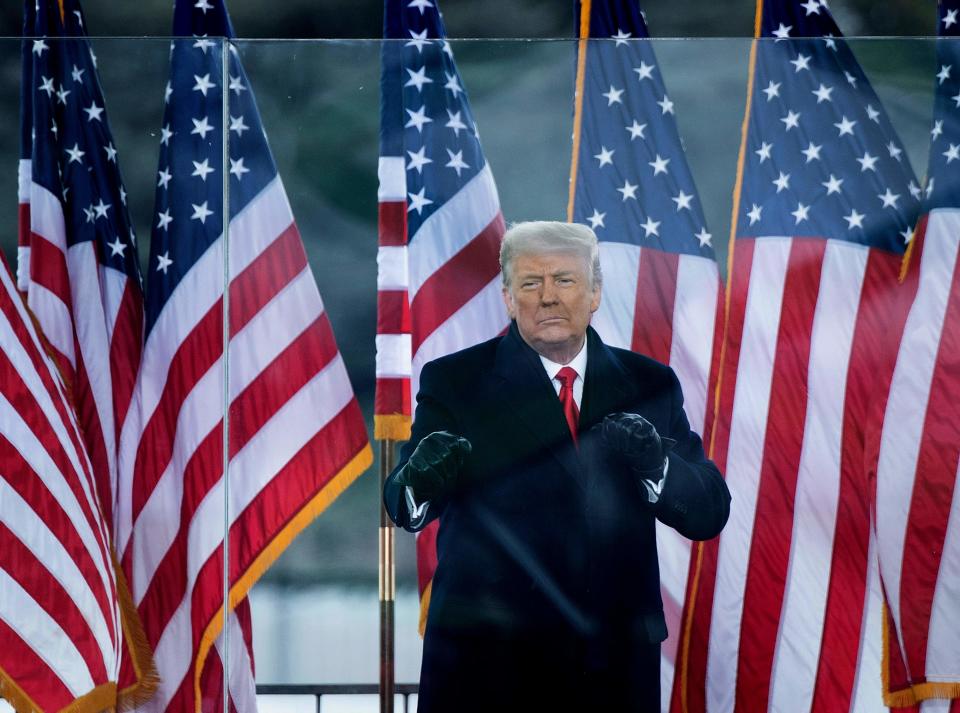Why we need a bipartisan censure to deal with Trump, not another circus impeachment trial
There’s a reason why U.S. criminal trials take so long, from building a case to impaneling a grand jury to months or years of preparation, and often weeks for the trial itself. We have decided that we want our justice system to operate on rules and logic, not passion.
That’s the opposite of our current impeachment environment.
It is a misnomer to call the Senate proceedings a trial in the purely judicial sense of the word. There is no right of the defendant, former President Donald Trump, to testify, and the Senate can consider a wide range of information. There is no process of discovery, no firm rules of evidence or other elements routinely expected in a courtroom — or even a television legal drama. The goal is also different. Impeachment is designed to remove a federal office holder — a president, vice president, federal judge, etc. – from office. No one leaves the Senate well in an orange jumpsuit and handcuffs.
Impeachment is just a political punishment for Trump
In the case of Mr. Trump, impeachment is about political punishment. The upcoming Senate trial seems more like an act of political score settling, not any kind of effort to get at the truth. Is now-Senate Minority Leader Mitch McConnell mad enough over his party’s losses in the Georgia Senate runoff races that he wants to make Trump pay and banish him from the Republican Party? Or is he leaning toward acquittal because he doesn’t want to fracture his political base?
Those may be interesting questions, but they have very little to do with the horrible riot and grievous injuries and deaths suffered by police officers protecting the U.S. Capitol on Jan. 6.
In fact, we are only in the earliest stages of the investigations into the events of that day. Depending on what is uncovered, views of Trump’s responsibility and accountability could change dramatically. Wouldn’t it be in the national interest to let those investigations play out before lawmakers render a verdict?

There is a better way. As a former defense attorney (and an American), I’d like the Senate to consider doing what it has historically done better and what it was designed to do: Come to an agreement on a political deal.
Trump impeachment: America has more important things to worry about than a Trump Senate impeachment trial
Senate censure is a political deal that offers something to both sides. Donald Trump is already out of office; there is no plausible need for a speedy Senate impeachment trial to remove him from the White House. An impeachment trial and vote conducted largely along party lines will only further divide our nation, and when the votes are counted, it will lose. Democrats can claim that they want Mr. Trump barred from holding future office, but the best way to ensure that is for them to do a great job with the majorities they hold now. Succeed in the next two or three years, and there will be no need to look in the rearview mirror to see whether Trump’s 2024 campaign bus is gaining speed.
Be careful what you wish for
Then consider this old adage: Be careful what you wish for. There is no provision for a defendant to request to testify in an impeachment trial, but what if Mr. Trump did? The Senate could say no, but how would that look, not only to his followers but to the world. Can you imagine being convicted in a trial where you aren’t allowed to tell your side? That’s very un-American.
Or what if the Democrats called the former president’s bluff and said, come testify? Well, Trump has held rallies all over the United States — now he’d have a chance to hold one in the Senate chamber, with wall-to-wall TV coverage, internet streaming and a trending hashtag on Twitter.
Censure, which only requires 51 votes, not 67, would allow lawmakers to make the point that there are consequences to highly inflammatory behavior in politics (a lesson that would be helpful to more than Mr. Trump). And it would provide a window for Republican senators who might want to vote their conscience but have issues with impeachment, whether they be constitutional, procedural or as a precedent for the future. A successful bipartisan censure would have far more sting than a second, failed partisan impeachment. And it offers something more.
After the Capitol riots: Dealing with the aftermath of the Capitol riots, do we need more restraint?
President Joe Biden made a heartfelt call for unity in his inaugural address. A bipartisan censure would be an opportunity for a true expression of unity: lawmakers on both sides deciding to hold Mr. Trump to account and setting a higher standard for all our elected leaders in the future.
Greta Van Susteren is the host of "Full Court Press" and of "Plugged In" on Voice of America TV. She is also a former television news anchor for CNN, Fox News and MSNBC. Follow her on Twitter: @greta
You can read diverse opinions from our Board of Contributors and other writers on the Opinion front page, on Twitter @usatodayopinion and in our daily Opinion newsletter. To respond to a column, submit a comment to letters@usatoday.com.
This article originally appeared on USA TODAY: Censure Trump instead of holding the impeachment trial

 Yahoo Movies
Yahoo Movies 
